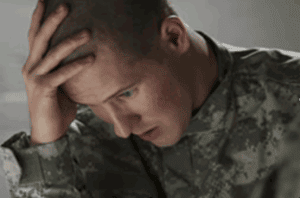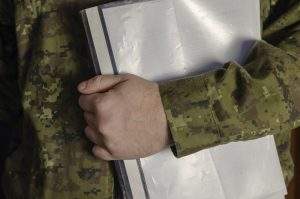Group therapy, a salve for the mentally wounded, is in trouble at the Miami VA. And Vietnam veterans like me are losing it.
True, as the saying goes, we dont know what we’ve got until its gone. The VA has touted the psychotherapy unit to which I belong as the most successful at the downtown hospital. Yet, its being taken away.
The popular treatment for post-traumatic stress disorder (PTSD) will no longer be available to those of us who served in Southeast Asia and still grapple with anxiety, flashbacks, nightmares, isolation, numbness, depression and, worse-case scenario, suicidal thoughts.
Forty years after the war, according to a Department of Veteran Affairs-funded study released in August, 11 percent of Vietnam veterans exposed to combat more than 283,000 continue to have symptoms of PTSD.
When the psychotherapy unit disbands within the next year, members will have the option to invest in a new program. We could find ourselves staring at our reflection through a different mirror of horror. The VA has paraded a 12-session alternative treatment, Cognitive Processing Therapy (CPT), that claims an easier route to coping with traumatic events so we could get back to living a consummate lifestyle. Back to our pre-warrior innocence?
With tension heavy enough on the brain, our group isnt buying such intensive, in-your-face therapeutics. We believe in our capacity to sort out bedeviling issues through comradeship that had served us well in the war.
Yet, though I share a protective stance with my brothers, Im the only one in the group to sign up for CPT, having tired of medication for this and that, even riveting ghostly nightmares and flashbacks that occasionally send up a wail through the fumes of the jungle in War Zone C.
The Miami VA declined to be interviewed for this report. But said in an email in response to questions:
The Miami VA Healthcare System has worked with our patients during the last two years to gradually move into evidence-based PTSD therapeutic interventions. While some long-term supportive therapy groups are available at the Miami VA and the three South Florida Vet Centers, we will continue to offer a wide range of mental health services to veterans struggling with PTSD and encourage veterans to take advantage of the health care benefits they have earned.
Although this VA-wide decision to move toward evidence-based therapy programs will impact veterans across the country, we feel confident that South Florida veterans will continue to have access to the quality programs and services that have helped so many make the successful transition to civilian life.
In the aftermath of a meltdown suffered while editing stories on deadline at the Miami Herald, the paper encouraged me to undergo deeper treatment, as did the VAs chief psychiatrist. Thereafter, I joined a dozen or so vets in weekly, hour-long sessions on Thursdays.
During the sessions, we sit in a horse-shoe arrangement, along with a therapist who runs the group. It is customary for members to introduce themselves while the new guy awaits his turn. That didnt go well for me. I had to announce a reason for being there. My unit lost 53 men on a landing zone to friendly fire by Air Force bombers just after choppers had inserted the company near the Cambodian border. I caught the news on Armed Forces Radio while in Saigon on a three-day pass. Unlike my friends, Id never been on R&R (rest and recuperation). And, with six days left on my tour, I had a premonition.
At first, the guilt seemed irredeemable. Then it dawned that, in the fog of postwar, every seat in that drab room at the VA, facing west (which cuts against the geographic grain of the war), doles out shards and tremors of rank trauma that members (and the therapist) deconstruct through valuable feedback. Members get to reinforce coping skills and achieve a heightened sense of accomplishment through raw and intense participation.
Operating through the free-form language of the grunt, group therapy really delivers the power of an entrenching tool. The program digs into your psyche and helps boost self-esteem and confidence. The familiar fox hole/bunker setting is safe and reassuring, allowing members to try new procedures without fear of failure.
I did something I hadnt done in many years, a group member acknowledges a few weeks after wed tackled the edgy subject of avoidance. Its very uncomfortable for me to be near people, especially in the dark with a crowd around me. But because of group, Ive gone to the movies and other places that Id never frequent.
Subsequently, the therapist suggested that we move out as a squad into mainstream society. It required a whopping leap of faith but weve gone fishing and to a Dolphins game on our own, from planning to execution.
For Hezekiah Small, a sergeant who led Marines in heavy combat against the North Vietnamese Army near the DMZ the demarcation line between North and South Vietnam straying beyond his comfort zone of isolation was a big social marker.
Group solves problems of the day, he says, keeping the illness and suicidal thoughts at bay. Without it we dont have that lifeline.
There are a lot of things we havent touched on yet, says a helicopter door gunner who experienced racism in his own platoon.
I did drugs and drank over there. If I didnt, Id have been a fruitcake. Came back. Nightmares. Alcohol. Drugs. Suicidal. A vet told me about the VA. I went to his house and he gave me an Agent Orange brochure. It addressed my diabetes. I took a chance and went.
They asked if Id ever seen a psychiatrist. Nope. I aint crazy. Then I saw a psych and started crying and banging on the desk. Thats how I got into group in 2000. The biggest benefit group gave me was how to control my emotions. Sometimes they get out of hand.
Alvin Winzer, whose experience as a machine gunner with the 25th Infantry Division is just a nerve away, manages anger by letting it out all at once inappropriately in an appropriate place.
I dont know when and how its coming out. But group pushes me back from the edge a little each time I go there.
Since he got shot in the chest in the iconic battle for Hue City during the Tet Offensive, one of the largest military campaigns for the Marines, the near-fatal wound for Charlie McShane has remained an emotional reference point for the war. All those buddies he lost. Earlier in his tour, McShanes squad of 14 was devastated when a buddy tripped a booby trap in Hoi An, killing four and wounding the others.
Many times Im alone on an island with my thoughts, but group has allowed me to build a bridge back to land, McShane says. Ive become more active in society, and I take action for my illness instead of wallowing in self-pity. Still, I continue with the struggle. The good thing about my treatment is that the guys in group have replaced those I left in Nam.
Group gives a little bounce to your life. Im grateful for 12 years of treatment. Part of me says Im glad its over now. I can stand on my own feet. Now I want to see how I can move forward. Yet I want group to continue far more than I want to cope without the lifeline of the brothers.
We never had a collective voice. Maybe we all realize that we dont like the way weve been treated and that could be the voice.
A member who leads a low-profile lifestyle admits hed miss those moments in group when he voiced his problems by venting a little steam.
Used to be Thursdays Id get back on my feet if I feel Im sliding, he says. Then the program changed to every two weeks, and now its monthly. Having a bad day? Who youre gonna talk to when its over? Its difficult to open up to strangers.
I dont need to watch war movies and be saturated with the dead, so we can be insensitive to that type of situation. Thatd make me worse. Back out into the street.
Were at retirement age and CPT is too intense for us. Three months of high intensity treatment with an obvious drop-out rate may work with 50 percent of Iraq and Afghanistan veterans. Which is a good program for a younger person who needs to go back to school and find employment so they could rebuild their life. We need to hang on to a continuous program for life, not something thats going to go away. Its wrong for the VA to stop the type of group that we have.
Winzer concurs. CPT is not for him.
I dont think they want to be in the room when they force me to recall a lot of stuff that I hold in, he fears.
And though well continue to have quarterly sessions with our psychiatrist, you dont have that interchange with somebody who knows what theyre saying. The psych has never seen a booby trap or been on ambush patrol like the guys in group. In certain instances, they cant relate. Now, without group, its gonna move me into an area where I might just step off the edge.
Nam has dropped us off into a world where you experience the trials and tribulations all over again. And Small, the Marine sergeant, believes weve come too far to look back. Weve gained unity and fellowship, he says.
And I dont want to discharge all that. The VA should reconsider, Small says. They close the door on us when we left Nam, and now theyre getting ready to close the door on our treatment. You never know when somethings gonna click.
For me, group is a continuation of life in Nam. The war never recedes. Theres no time out. It haunts in the recesses of the mind. No wonder veterans average 22 suicides a day. Reaction is a trigger away. Im stuck in Nam. I live it. And if I have to relive the trauma by scraping the soul so I could think about my trauma in a different way than Ive been doing in group by writing or by talking to the therapist about it then I hope to be free of the ghosts that I once thought Id banish.
Theres this other you that feels responsibility for the fate of your comrades. Christ, my mission was about controlling insertions and extractions on the battlefield.
Small wonder in my nightmares Im forced to stand in front my house on the corner to watch a matinee of the theater of war. Wrapped in gauze flecked with dirt and blood, the ghosts ride two trailers in a tangle of broken limbs and Picasso faces. Such hallucination jangle the nerves, robbing me of sleep. Only when my wife walks into the no-fire zone on the patio at 5 a.m. do I realize Im taking absolution to the edge of pathology. Better call the VA, she says, worrying that I could be backsliding.
All these years, groups been remarkable in helping me cope, and keep the ghosts out of my head.
Those trusty guys in group offer feedback. A lot. Now, all gone in the garbage: the helmet, the ribbons, medals the accouterments of combat.
Three months after the cleansing, another nightmare. It catches my breath because there are no bent-up corpses on trailers rumbling past the house. Just an ol olive drab U.S. Army Jeep, a dingy white star painted on the cowling, slowly rounding the corner.
I pick up the white flag sticking out from the grill and exhale that it’s over.
Oh, how Id miss these guys in group! They mattered so much these past 12 years.
Dalton Narine served as a features editor and writer at the Miami Herald until his early retirement in 2004 due to further treatment for PTSD.





